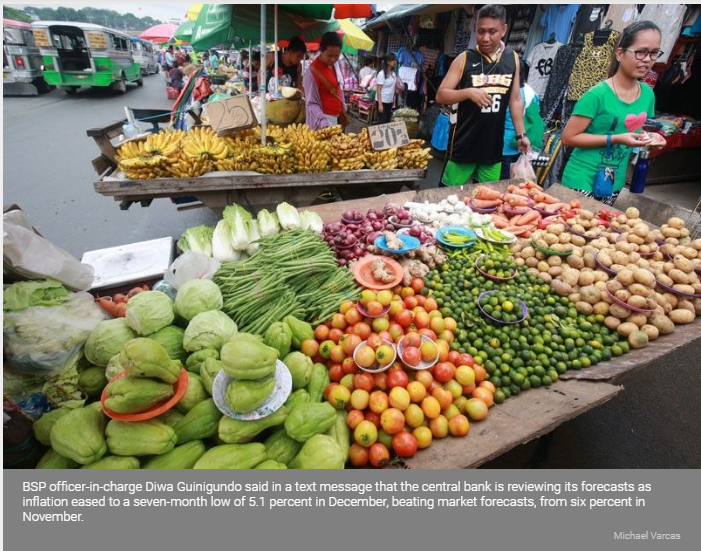Philippines: BSP sees early easing of inflation
MANILA, Philippines — Headline inflation may ease back to the two to four percent target earlier than expected this year, according to the Bangko Sentral ng Pilipinas.
BSP officer-in-charge Diwa Guinigundo said in a text message that the central bank is reviewing its forecasts as inflation eased to a seven-month low of 5.1 percent in December, beating market forecasts, from six percent in November.
“We are doing again our forecasts given the lower December inflation. Original forecasts indicate that monthly inflation could start going back to two to four percent target as early as the last part of the first quarter, but still close to the high end,” he said.
The last time monthly inflation fell within the BSP’s two to four percent target was in February last year when it averaged 3.8 percent, after which it climbed steadily to peak at a near-decade high of 6.7 percent in September and October 2018.
Based on its assessment last Dec. 13, the BSP lowered its inflation forecast for 2019 to 3.2 percent as it expects the rise in consumer prices to ease within the two to four percent target in the first quarter rather than the second quarter.
The central bank also slashed its inflation forecast for 2020 to three percent instead of 3.3 percent.
Inflation soared to 5.2 percent last year, exceeding the target range of two to four percent for the first time since 2008, from 2.9 percent in 2017 due to higher oil and food prices as well as weak peso which emerged as the third worst performing currency in the region.
Guinigundo had said the supply-driven inflation process in 2018 would not to be persistent and therefore short lived as shown by the negative month-on-month inflation rate in December.
The BSP deputy governor added the annual impact of the implementation of Republic Act 10963 or the Tax Reform for Acceleration and Inclusion (TRAIN) Law was less then one percentage point and diminishing.
Core inflation eased to 4.7 percent in December from 5.1 percent in November, suggesting that demand pressures have not significantly built up.
“As we indicated previously, the uptick in core inflation was rather an aberration
brought about by one single factor of higher transport cost due to adjustment in transport fare. But for December, as expected following the non-convergence of various measures of core inflation, the official core inflation actually eased,” Guinigundo said.
The central bank’s Monetary Board raised interest rates by 175 basis points from May to November last year to prevent inflation from spiraling out of control. However, it paused from its tightening episode in December as inflation is seen easing back to the two to four percent target range earlier than expected.
“The aggressive monetary tightening the BSP implemented from May to November was therefore aimed only at ensuring that the supply shocks from more than 60 percent increase in oil prices and the significant inflation rates of rice, fish, meat and vegetables did not evolve into sharp gains in wages, transport fares and prices of other services,” Guinigundo said.
Without a monetary response, he said it would have been possible for inflation expectations to be disanchored beyond reasonable proportions.
“What was also pivotal in the anti-inflation efforts was the decisive action of the government to immediately undertake non monetary measures including the liberalized importation of key commodities including rice, fish, meat and sugar,” he said.
The BSP vowed to confront the issue of inflation with appropriate and vigilant stance of monetary policy in recognition of the remaining risks both here and abroad without losing sight of the requirements of economic growth.
“But the BSP shall also keep on relying on the analytics of what recent data would suggest in terms of the direction and magnitude of any potential monetary action,” Guinigundo said.
Source: https://www.philstar.com/business/2019/01/07/1882853/bsp-sees-early-easing-inflation#68HrvL7eVY8UK9uW.99


 Thailand
Thailand




